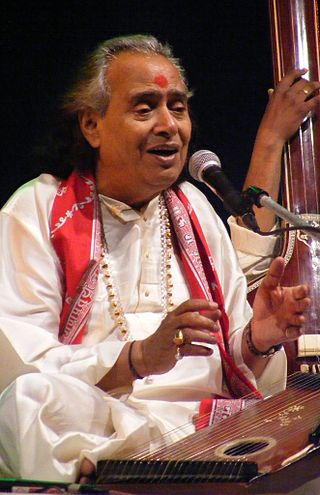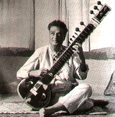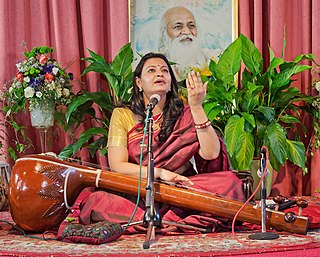Dhrupad is a genre in Hindustani classical music from the Indian subcontinent. It is the oldest known style of major vocal styles associated with Hindustani classical music, Haveli Sangeet of Pushtimarg Sampradaya and also related to the South Indian Carnatic tradition. It is a term of Sanskrit origin, derived from dhruva and pada. The roots of Dhrupad are ancient. It is discussed in the Hindu Sanskrit text Natyashastra, and other ancient and medieval Sanskrit texts, such as chapter 33 of Book 10 in the Bhagavata Purana, where the theories of music and devotional songs for Krishna are summarized.

Jasraj was an Indian classical vocalist, belonging to the Mewati gharana. His musical career spanned 75 years resulting in national and international fame, respect and numerous major awards and accolades. His legacy includes memorable performances of classical and semi-classical vocal music, classical and devotional music, albums and film soundtracks, innovations in various genres including Haveli Sangeeth and popularizing the Mewati Gharana – a school of thought in Hindustani classical music. Pandit Jasraj taught music to amateur and professional students in India, Europe, Canada and the United States.
Zia Fariduddin Dagar was an Indian classical vocalist belonging to the Dhrupad tradition, the oldest existing form of north Indian classical music. He was part of the Dagar family of musicians.

The Gundecha Brothers are Indian classical singers of the dhrupad genre of the Dagar vani. From 1985 to 2019 the duo consisted of brothers Umakant Gundecha and Ramakant Gundecha and were awarded the Padma Shri for art for 2012. Following the death of Ramakant Gundecha in 2019, his son Anant began to perform with Umakant in the Gundecha bandhu.
The Gwalior Gharana is one of the oldest Khyal Gharana in Indian classical music. The rise of the Gwalior Gharana started with the reign of the Mughal emperor Akbar (1542–1605).

Pandit Chhannulal Mishra is a celebrated Hindustani classical singer from Banaras, a noted exponent of the Kirana gharana (school) of the Hindustani classical music and especially the Khayal and the 'Purab Ang' – Thumri.
Gajanan Anant Joshi, better known as "Gajananbuwa Joshi", was an Indian vocalist and violinist in the field of Hindustani music.

Ustad Abdul Rashid Khan was an Indian vocalist of Hindustani music. Apart from khayal, he performed dhrupad, dhamar and thumri. As of 2020, he is the oldest person to have been conferred a Padma award.

Malabika Kanan was an Indian classical vocalist.
N. Rajam is an Indian violinist who performs Hindustani classical music. She remained professor of music at Banaras Hindu University, eventually became head of the department and the dean of the Faculty of Performing Arts of the university.

Samta Prasad was an Indian classical musician and tabla player from the Benares gharana. He played tabla in many Hindi films including, Meri Surat Teri Ankhen (1963) and Sholay (1975), and film music composers Rahul Dev Burman and Bappi Lahiri were his disciples.
Pandit Uday Bhawalkar is an Indian classical vocalist. He is an exponent of the dhrupad genre.

Abdul Halim Jaffer Khan was an Indian sitar player. Khan received the national awards Padma Shri (1970) and Padma Bhushan (2006) and was awarded the Sangeet Natak Akademi Award for 1987.
Rahim Fahimuddin Dagar was an exponent of Dagar vani Dhrupad of Indian classical music. He represented the 19th generation of Dagar Tradition. His cousins Nasir Moinuddin Dagar and Nasir Aminuddin Dagar were known as the Senior Dagar Brothers. Similarly, Nasir Zahiruddin and Nasir Faiyazuddin Dagar were known as the Junior Dagar Brothers. His other cousins were Zia Mohiuddin Dagar, Fariduddin Dagar, and H. Sayeeduddin Dagar.

Siyaram Tiwari was an Indian classical singer and leading exponent of Dhrupad-genre of Hindustani classical music. He belonged to the Darbhanga gharana and was based in Patna. Though Darbhanga gharana is known for its laykari techniques, he was the first exponent of the gharana to promote fast-paced laykari in Dhrupad, which developed in the second half of 20th-century.
Pandit Asit Kumar Banerjee is one of the few remaining rudra veena players in India. He is the disciple of Ustad Zia Mohiuddin Dagar, and can play both Sitar and rudra veena. He was the head of the Department of Instrumental Music in The Anand Foundation, Punjab, and has performed many rudra veena concerts both in India and abroad.
The Dhrupad Kendra Bhopal is an institution for training Dhrupad singers, established by the Government of Madhya Pradesh in the state capital Bhopal in 1981 to impart training in the Indian teacher-apprentice or Guru-shishya tradition of education in Dhrupad one of the oldest surviving genres of Indian classical music.

Meeta Pandit is a Hindustani Classical vocalist and a leading exponent of the Gwalior Gharana. She is the granddaughter and disciple of Krishnarao Shankar Pandit and daughter of Laxman Krishnarao Pandit. She is the sixth in the unbroken lineage and the first woman in the family to have taken up music as a profession.
Gaan Maharishi Pt. Krishnarao Shankar Pandit (1893–1989) was an Indian musician, considered by many as one of the leading vocalists of the Gwalior gharana. He authored several articles and 8 books on music and was the founder of Shankar Gandharva Mahavidyalaya, a music college based in Gwalior. The Government of India awarded him the third highest civilian honour of the Padma Bhushan, in 1973, for his contributions to music. He was also a recipient of several other honors, including the 1959 Sangeet Natak Akademi Award and the 1980 Tansen Award of the Government of Madhya Pradesh.
Pandit Falguni Mitra is an Indian Hindustani classical vocalist who is known as a Dhrupad exponent of India. Mitra belongs to the Bettiah gharana.












